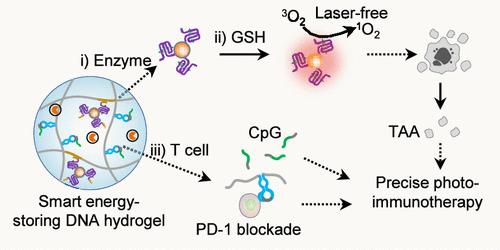Smart Energy-Storing DNA Hydrogel for On-Demand Laser-Free Photoimmunotherapy of Melanoma
IF 15.6
1区 化学
Q1 CHEMISTRY, MULTIDISCIPLINARY
引用次数: 0
Abstract
Photoimmunotherapy, which synergizes phototherapy and immunotherapy, holds significant potential for cancer treatment but demands more precise and effective strategies. Herein, we present a smart DNA hydrogel with energy-storing capabilities that responds to multiple tumor markers, enabling laser-free, on-demand photoimmunotherapy for localized melanoma treatment. The hydrogel is constructed from two single-stranded DNA chains via rolling-circle amplification, incorporating aptamers (Apt PD-1), oligonucleotides (CpG ODNs), and recognition sites for the HhaI endonuclease, enabling a controlled release of the photodynamic module. This module, composed of the AS1411 aptamer, a photosensitizer, and energy-storing persistent luminescent nanoparticles, facilitates selective tumor cell uptake and glutathione-triggered phototherapy in the absence of external irradiation, generating tumor-associated antigens for immunotherapy. Upon specific binding to T cells, Apt PD-1 blocks PD-1 receptors, promoting the release of CpG ODNs to enhance immunotherapy. In a murine melanoma model, the photoimmunotherapy system achieved a tumor inhibition rate of 73.3%. This laser-free, on-demand strategy based on the energy-storing DNA hydrogel offers a precise approach to cancer therapy and highlights the potential of DNA materials in advancing precision medicine.

用于黑色素瘤免激光光免疫治疗的智能储能DNA水凝胶
光免疫疗法是光疗法和免疫疗法的协同作用,在癌症治疗中具有巨大的潜力,但需要更精确和有效的策略。在此,我们提出了一种具有能量存储能力的智能DNA水凝胶,可响应多种肿瘤标记物,使局部黑色素瘤的无激光,按需光免疫治疗成为可能。水凝胶由两条单链DNA链通过滚环扩增构建而成,结合适体(Apt PD-1)、寡核苷酸(CpG ODNs)和HhaI内切酶的识别位点,实现光动力模块的可控释放。该模块由AS1411适配体、光敏剂和储能持久发光纳米粒子组成,促进肿瘤细胞选择性摄取和谷胱甘肽触发的光疗,在没有外部照射的情况下产生用于免疫治疗的肿瘤相关抗原。Apt PD-1与T细胞特异性结合后,阻断PD-1受体,促进CpG ODNs的释放,从而增强免疫治疗。在小鼠黑色素瘤模型中,光免疫治疗系统实现了73.3%的肿瘤抑制率。这种基于储能DNA水凝胶的无激光按需策略为癌症治疗提供了一种精确的方法,并突出了DNA材料在推进精准医学方面的潜力。
本文章由计算机程序翻译,如有差异,请以英文原文为准。
求助全文
约1分钟内获得全文
求助全文
来源期刊
CiteScore
24.40
自引率
6.00%
发文量
2398
审稿时长
1.6 months
期刊介绍:
The flagship journal of the American Chemical Society, known as the Journal of the American Chemical Society (JACS), has been a prestigious publication since its establishment in 1879. It holds a preeminent position in the field of chemistry and related interdisciplinary sciences. JACS is committed to disseminating cutting-edge research papers, covering a wide range of topics, and encompasses approximately 19,000 pages of Articles, Communications, and Perspectives annually. With a weekly publication frequency, JACS plays a vital role in advancing the field of chemistry by providing essential research.

 求助内容:
求助内容: 应助结果提醒方式:
应助结果提醒方式:


